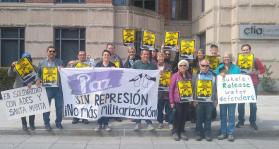Parties announce candidacies for upcoming midterm elections in El Salvador
Just months after the historic election of leftist President Salvador Sánchez Cerén, El Salvador is already gearing up for another critical electoral battle, this time at the legislative and municipal level. On March 1, 2015, the governing Farabundo Martí National Liberation Front (FMLN) party hopes to expand legislative and local support for the executive government, while the primary right-wing opposition party, the Nationalist Republican Alliance (ARENA), will seek to regain lost ground and re-energize its divided bases following a series of electoral defeats.
While the formal campaign period will not begin until early next year, parties across the political spectrum have announced candidacies, and the biggest mayoral races are already heating up. In the capital city of San Salvador, current ARENA mayor and former presidential candidate Norman Quijano is facing off against Nayib Bukele, the popular young FMLN mayor of the San Salvador suburb Nuevo Cuscatlán. Walter Araujo, a former magistrate in the Supreme Electoral Tribunal who defected from the ARENA party, is also running as the right-wing Grand National Alliance (GANA) party’s mayoral candidate for San Salvador.
Another high-profile mayoral contest is in the wealthy suburb of Santa Tecla, whose former popular FMLN mayor Óscar Ortíz was elected Vice President. Santa Tecla’s voters will choose between former Minister of Economy Armando Flores of the FMLN and the ARENA candidate, current legislator Roberto D’Abuisson, whose father of the same name founded the right-wing party and was a principal architect of the country’s Civil War-era death squads.
The 2015 races will mark the first time that city councils will have proportional representation of the competing parties, with the winning party receiving a majority of seats. Also, for the first time all parties must now run at least 30% women candidates, thanks to a recently approved Political Parties Law. The FMLN’s statutes already require 35% women’s participation in candidacies and 25% young people; however, the party has faced criticism from within its ranks for the low number of women announced for high-profile candidacies.
FMLN mayoral and legislative candidates are nominated by local party activists to municipal and provincial councils, which then propose nominations to the party’s national council. The candidacies were officially ratified at the FMLN’s National Convention on August 31st. In years past, ARENA party leadership appointed its candidates, but following the 2014 presidential defeat and major internal divisions, the party was forced to adopt a secret ballot mechanism.

 "I am a CISPES supporter because continuing to fight for social justice and a more people-centered country means continuing the dream and sacrifice of thousands of my fellow Salvadorans who died for that vision.” - Padre Carlos, New York City
"I am a CISPES supporter because continuing to fight for social justice and a more people-centered country means continuing the dream and sacrifice of thousands of my fellow Salvadorans who died for that vision.” - Padre Carlos, New York City

